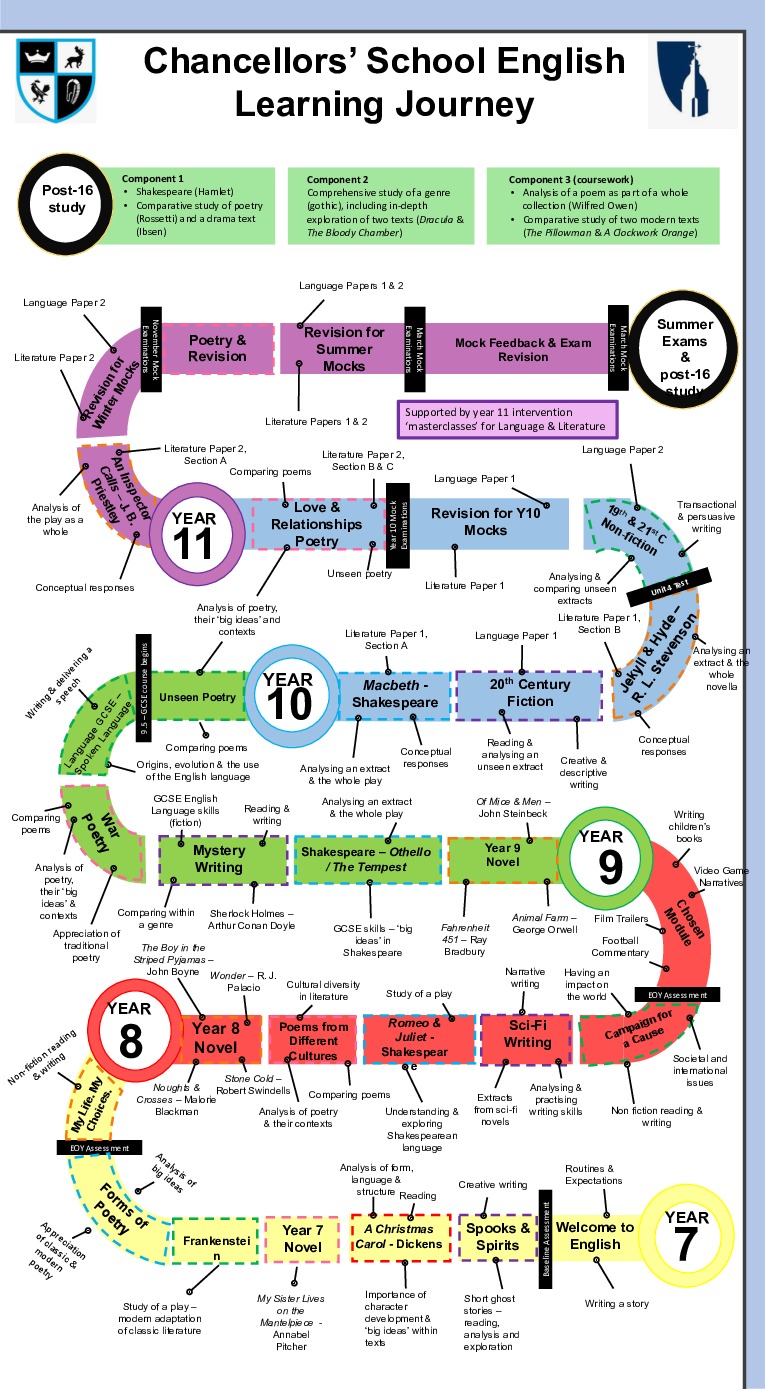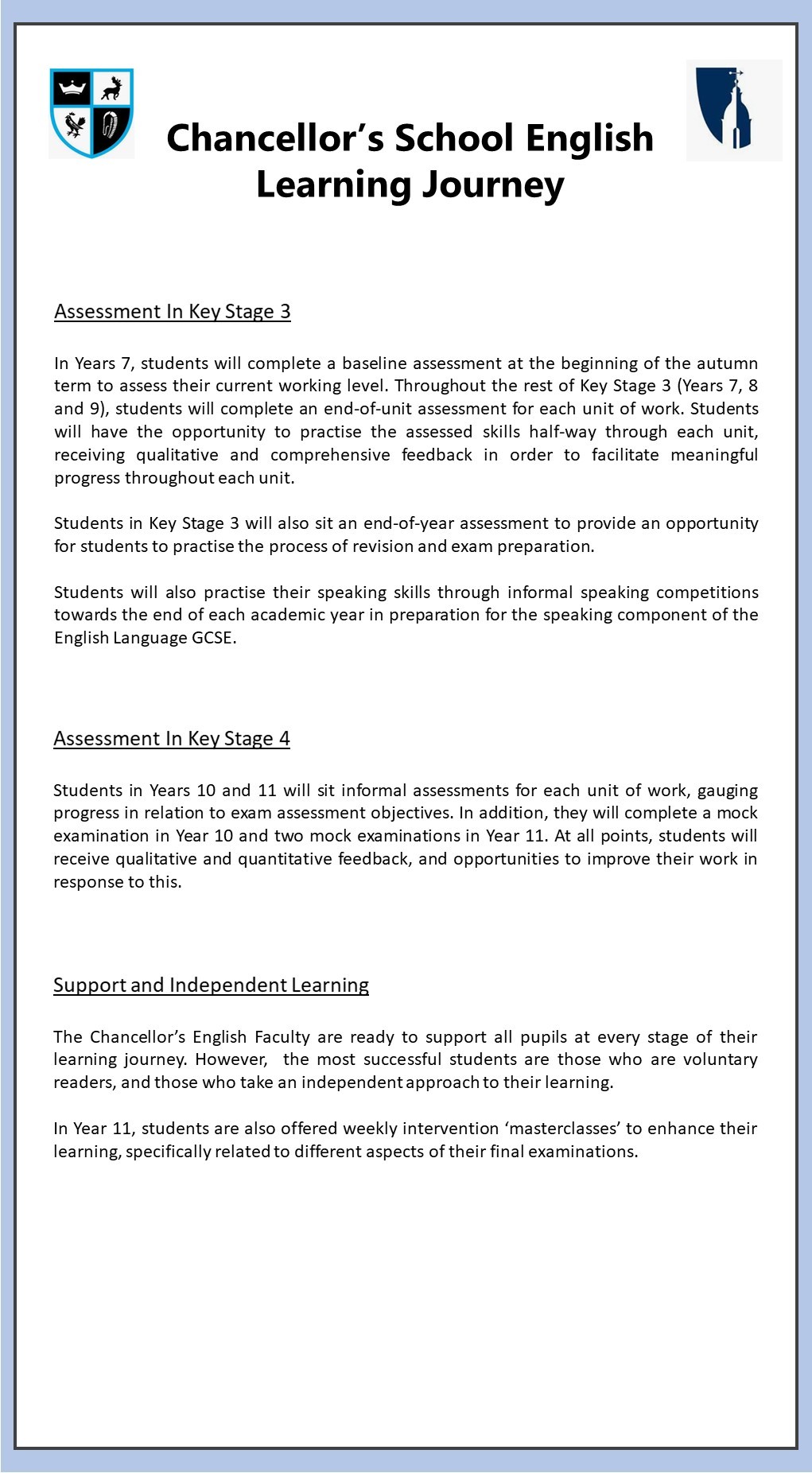English
Introduction
Our aim in the English Faculty is to enthuse students with a love of the English language, a passion for ideas and an empathy for the experiences and perspectives of others. We also aim to equip students with the tools to respond to texts in a mature, thoughtful and independent way. As a department, we follow shared and varied schemes of work but have the flexibility to teach to our diverse enthusiasms.
Key Stage 3
Year 7 are taught in their form groups (making them mixed ability), and Years 8 and 9 are taught in seven mixed ability groups. The main topics covered in each year are:
Year 7
- Jan – February: Forms of Poetry
- Mar – April: Frankenstein
- May – June: Non-fiction Writing
- June – July: Class reader
Year 8
- September - October: Class Reader
- November - December: Narrative Writing
- January - February: Media
- March - April: Writing from Different Cultures
- May - June: Shakespeare (Romeo and Juliet)
- June - July: Module Choices (Students choose an English Topic to study)
Year 9
- Sept – October: 20th Century Novel
- Nov – December: War Poetry
- Jan – February: Mystery Writing: Sherlock
- Mar – April: Shakespeare
- May – June: Non-Fiction
- June – July: Intro to GCSE
Assessment Information
All students in Years 7, 8 and 9 are formally assessed once per half term for reading and writing, based on the unit being studied. One of these assessments will form their progress threshold for that half term. Students will be formally assessed for Speaking and Listening three times over the course of the year for individual and group contributions.
Key Stage 4
At Chancellors, students are prepared for both GCSE Language and GCSE Literature in a combined course. We enter students for AQA Literature and Educas Language. Students will encounter a wide range of great writing, both fiction and non-fiction texts. These include: The Strange Case of Dr Jekyll and Mr Hyde; Macbeth; An Inspector Calls, as well as Love and relationships Poetry. Students will explore how writers engage and delight their readers; they will study their methods and assess their own responses to the ideas presented in their texts. They will learn about the importance of society and political and social ideas in the creation of great literature and develop skill in assessing how this context impacts on the meanings in a text. Students will also develop their own writing skills, from creative writing to persuasive and transactional writing.
Year 10: Key topics: Language
- September – October: Non-fiction Writing
- November – December: Formal Writing
- January – February: 19th Century Extracts
- March – April: 21st Century Extracts
- May – June: Creative Writing
- June – July: Spoken Language
Year 10: Key topics covered: Literature
- September – October: Macbeth
- November – December: Macbeth
- January – February: An Inspector Calls
- March – April: An Inspector Calls
- May – June: Unseen Poetry
- June – July: Anthology Poetry (Love and Relationships)
Year 11: Key topics covered: Language
- September – October: 20th Century Literature
- November – December: Non-fiction Writing
- January – February: 19th/20th and 21st Century Extracts
- March – April: Revision/retakes
- May – June: Revision
- June – July: Revision
Year 11: key topics covered: Literature
- September – October: The Strange Case of Dr Jekyll and Mr Hyde
- November – December: The Strange Case of Dr Jekyll and Mr Hyde
- January – February: Anthology Poetry
- March – April: Revision
- May – June: Revision
- June – July: Revision
GCSE Exam Board and Syllabus Number
- AQA English Literature
- Eduqas (WJEC) English Language
Pastoral GCSE
There are specific guides that individual teachers suggest to help with certain parts of the course (e.g. Macbeth) but generally, most guides are useful and it depends how much you want to spend. Help for students is available by arrangement with the individual English teacher.
The English department runs both a targeted intervention programme and a ten week revision programme prior to the exams.
Recommended websites are: Universal Teacher / BBC bitesize / WJEC
Key Stage 5
We offer English Literature at A Level, and Film AS and A Level. Both courses are taught by specialist members of the faculty with a wide experience and expertise in the subjects.
- English Literature exam board: OCR
- Film AS and A Level exam board: WJEC
Extra-Curricular
We offer a wide range of extracurricular opportunities throughout the Key Stages.
Key Stage 3
- Debate club
- Film club
- Book club
- Trips to The Globe
- Visiting workshops
GCSE
- Debate club
- Film club
- Book club (teenage+)
- Visiting workshops
- GCSE Stretch and challenge workshops
A Level
- Film club
- Various course-related trips (theatre, BFI, etc.)
Visiting workshops
Film Studies
Introduction
Film Studies is a highly accessible subject that aims to enlighten and engage students in the world of film. Students will work on analysing films as texts, looking at both the production of films and the social/political/cultural aspects that inspire them. Students are taught to work independently and are encouraged to be confident in their own views and ideas. The department’s aim is for students to discover their creative abilities and closely analyse and interpret different films, whilst building on a passion for films that are beyond the realms they have already experienced as an audience.
Key Stage 4
Students now have the opportunity to take Film Studies GCSE as an option subject. This is an exciting new course which introduces the creative and practical world of film. Students will study a range of films, from the earliest film-makers to Hollywood; world cinema and independent British films. Students will explore all aspects of how films are made. Units will include: cinematography; sound and editing; mise-en-scene and style, developing a vocabulary for writing about their chosen films. Although primarily a written subject, students will have the opportunity to create and direct their own short film. This option provides a thorough grounding for students wishing to study film at A Level.
Key Stage 5
Students will cover a range of films throughout the course; it aims to broaden horizons and introduce students to films they may not have encountered before. This will range from classic Hollywood cinema to independent films. There will also be a chance to explore different genres of film, including documentary cinema and foreign language films. The course will be weighed heavily on exams, but will also include a creative coursework element, with students having the chance to create their own short film or write a screenplay for their own short film.
Extra-Curricular
As part of the course, students may get the chance to go on relevant cinema trips. There might also be an opportunity to visit the British Film Institute, for research purposes or for school study events.



